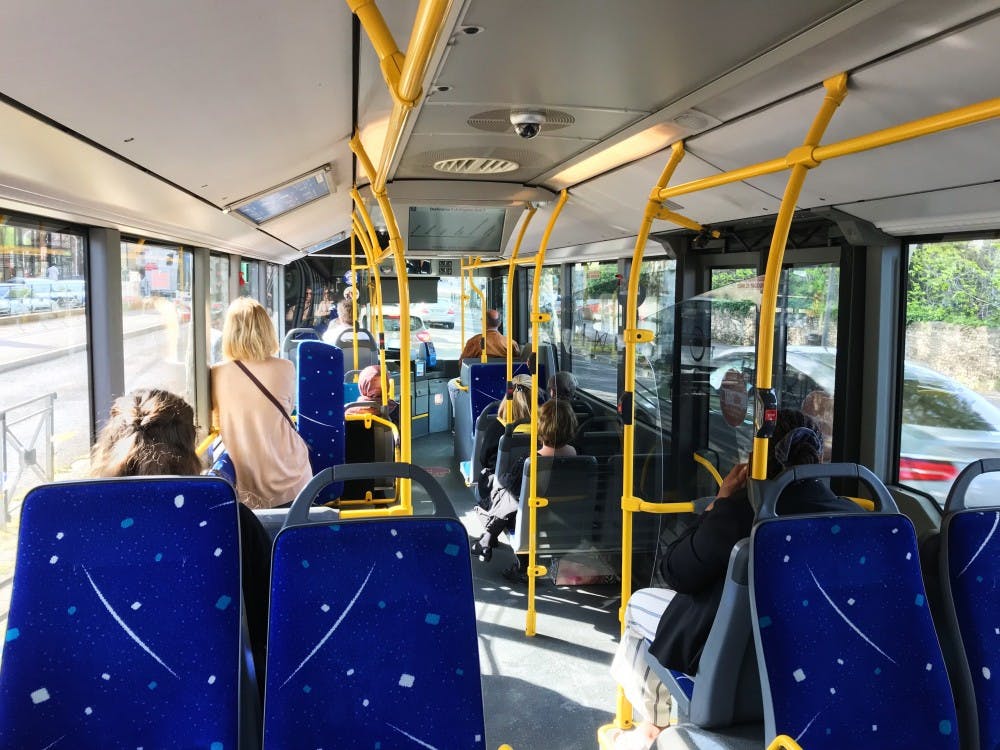As a freshman at IU, I acquainted myself with Bloomington through its bus system. Specifically, I made trips to Target and Kroger on the 9 bus.
I know now Target and Kroger hardly qualify as Bloomington proper. Nonetheless, the slight befuddlement I felt on those trips, unsure the bus would in fact deliver me to my destination, helped me create a mental map of Bloomington.
This lesson is one I forgot when I moved to Aix-en-Provence, France, in January to study at a university here for the semester.
As a Midwesterner unaccustomed to the practices of public transportation, I’ve always found myself suspicious of it as a form of reliable travel, even while attempting to traverse cities as sprawling as Rome. After all, the Midwest is not a land made for ease of public transport. But when I realized my apartment this semester was a 40-minute walk from my university, the bus became a necessity. And I’m glad it has.
The bus allows me to see more of the city than I would walking. I love watching the now-green trees whiz by, their smooth bark offset by the dusty yellow buildings native to the city.
Any given bus on a weekday morning is a microcosm of the city itself. Two distinct populations occupy it: students — Aix is a university town — and elderly people. On market days, I often spot the same elderly man tug along a shopping cart with him as he exits at the stop in the thick of the fruit and produce stalls.
The buses also helped me settle into the rhythms of French culture. Here, bonjour and au revoir, or hello and goodbye in English, are important for social interactions, even in restaurants, stores or, yes, buses.
At first, I was resistant to au revoir as a universal farewell because it literally translates to something along the lines of "until I see you again.” Why would I say that to a bus driver or cashier? The odds of me seeing them again are low. So, I worked my around it with phrases such as bonne journée or merci as substitutes, which mean "have a good day” and “thank you” in English.
As you can imagine, this grew exhausting. Now every time I exit the bus, I contribute to the chorus of au revoirs.
Like the restaurants and shops of the country, the bus system operates on limited hours — never there for me to catch a ride to the regional bus station for an early morning departure or catch one home at 10 p.m. from a friend’s apartment. Many don’t operate on Sundays, just as the rest of France more or less shuts down for the day.
My bus rides are a reminder I was never going to pass as French, even without the immediate giveaway of my non-native accent. Backpacks are not in style here, and neither is the sight of my reusable water bottle peeking out from the side pouch of my backpack. Instead, chic shoulder bags and satchels reign supreme. Girls wear skirts with black tights and crisp white sneakers, an ensemble my wardrobe lacks.
I could be accused of romanticizing my time on Aix’s buses. I’ll admit I’m susceptible to the allure of everyday practices I never grew up with, something public transportation lends itself to. But there is a beauty to the way taking the bus can unveil a place and make it comprehensible.
Once I acclimated myself to the public transportation in Aix-en-Provence — and, specifically, my chosen routes — folding myself into city life became easier. I think back to the first few days when I nervously edged my way onto buses, when the one I wanted to take flew past me because I didn’t know it’s necessary to signal or the drivers won’t stop.
These aren’t worries I hold now, after having learned how the timetables function and where all the major stops are located. If anything, I enjoy my moments on the bus. They make me feel like a true inhabitant of this place and not just someone passing through for a few months — and that is a small victory I will happily embrace.






